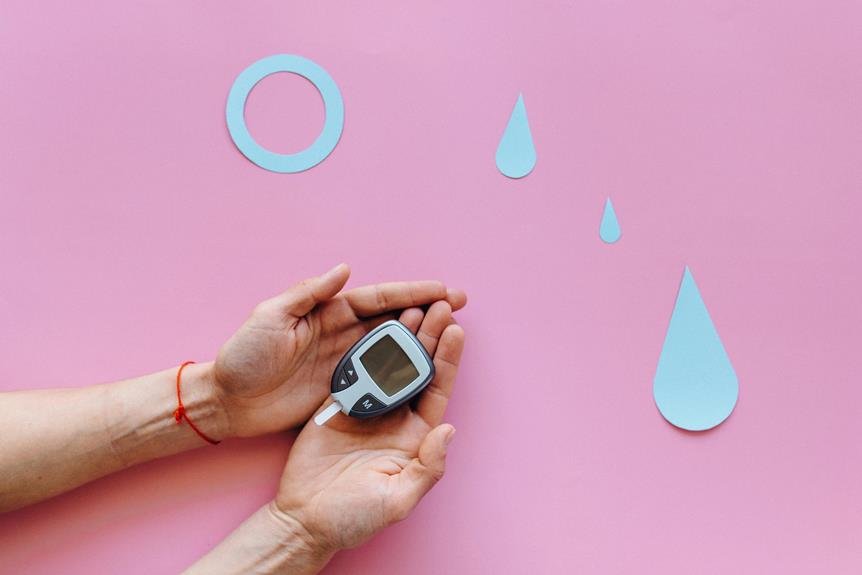Living Well With Diabetes Neuropathy: Lifestyle Tips and Advice
Imagine navigating the complexities of daily life while the sensation in your extremities feels like a distant memory. Living with diabetes neuropathy can be challenging, but there are ways to enhance your quality of life.
By making simple yet impactful lifestyle changes, you can effectively manage the symptoms and progression of this condition. From diet modifications to stress management techniques, a holistic approach is key to regaining control over your well-being.
Stay tuned to discover practical tips and advice that can empower you on your journey to living well with diabetes neuropathy.
Understanding Diabetes Neuropathy
Understanding diabetes neuropathy begins with grasping how high blood sugar damages nerves in the body. When your blood sugar levels are consistently elevated, it can lead to nerve damage over time. The excess sugar in your blood hinders the nerves' ability to function properly, impacting their communication with the brain and other parts of the body. As a result, you may experience symptoms such as tingling, numbness, or pain in your extremities.
It is crucial to monitor your blood sugar levels regularly to prevent further nerve damage. By keeping your blood sugar within a healthy range, you can slow down or even halt the progression of neuropathy. Making lifestyle changes, such as following a balanced diet, exercising regularly, and taking medications as prescribed by your healthcare provider, can help you manage your blood sugar levels effectively.
Educating yourself about diabetes neuropathy empowers you to take control of your health and well-being. By understanding how high blood sugar affects your nerves, you can make informed decisions to prevent complications and live well with diabetes.
Importance of Blood Sugar Control
To manage your diabetes neuropathy effectively, it's crucial to keep a close eye on your blood sugar levels and make healthy food choices. Monitoring your sugar levels regularly will help you understand how different foods affect your body and enable you to make informed decisions.
Sugar Level Monitoring
Monitoring your blood sugar levels is crucial for effectively managing diabetes neuropathy and maintaining your overall health. By regularly checking your blood sugar levels, you can track how your body responds to different foods, activities, and medications. Consistent monitoring helps you make informed decisions about your lifestyle choices and treatment plan.
Keeping your blood sugar within the target range recommended by your healthcare provider can prevent complications associated with diabetes neuropathy, such as nerve damage and circulation problems. It also reduces the risk of other serious health issues like heart disease and kidney damage.
Healthy Eating Choices
Making healthy eating choices plays a crucial role in controlling your blood sugar levels effectively while managing diabetes neuropathy. Opt for whole grains, lean proteins, fruits, and vegetables to keep your blood sugar stable. Avoid sugary drinks, processed foods, and excessive carbs that can cause spikes in your glucose levels.
Focus on portion control and eating balanced meals throughout the day to maintain steady energy levels. Incorporate fiber-rich foods to help regulate blood sugar and improve digestive health. Remember to stay hydrated and limit alcohol consumption, as it can impact your blood sugar levels.
Incorporating Physical Activity
To start incorporating physical activity into your routine, consider trying exercises specifically aimed at providing relief for neuropathy symptoms. Movement therapy can bring numerous benefits like improved circulation, reduced pain, and enhanced nerve function.
Exercise for Neuropathy Relief
Incorporate regular physical activity into your routine to help alleviate symptoms of neuropathy and improve overall well-being. Aim for a mix of aerobic exercise, like walking or swimming, and strength training to enhance muscle strength.
Start slowly and gradually increase intensity to avoid overexertion. Choose activities that you enjoy to stay motivated and make exercise a regular habit. Consider low-impact options such as yoga or tai chi to improve balance and flexibility.
Always remember to check your blood sugar levels before and after exercising, and stay hydrated. Listen to your body and adjust your workout intensity as needed. Consistency is key, so aim for at least 30 minutes of moderate activity most days of the week to reap the benefits.
Benefits of Movement Therapy
Get ready to discover the numerous benefits that movement therapy, incorporating physical activity, can bring to managing diabetes neuropathy. Engaging in regular physical activity not only helps improve blood sugar control and insulin sensitivity but also enhances circulation, which is crucial for nerve health.
Movement therapy can reduce neuropathic pain and discomfort by releasing endorphins, the body's natural painkillers. Additionally, exercise promotes better sleep quality, reduces stress levels, and boosts overall mood and well-being.
Adopting a Balanced Diet
Maintaining a balanced diet is essential for managing diabetes neuropathy effectively. By focusing on nutrient-dense foods and portion control, you can help stabilize blood sugar levels and support nerve health. Aim to include a variety of fruits, vegetables, whole grains, lean proteins, and healthy fats in your meals.
When planning your plate, think about filling half with non-starchy vegetables like leafy greens, broccoli, and bell peppers. Incorporate lean proteins such as chicken, fish, tofu, or legumes to help maintain muscle mass and promote satiety. Opt for whole grains like quinoa, brown rice, or whole-wheat pasta to provide fiber and sustained energy.
Limiting processed foods, sugary snacks, and high-fat items can also benefit your overall health. Be mindful of portion sizes and try to eat at regular intervals throughout the day to prevent blood sugar spikes. Remember, small changes to your eating habits can have a big impact on managing diabetes neuropathy effectively.
Managing Stress and Mental Health
To effectively manage diabetes neuropathy, prioritizing your mental well-being and stress levels is crucial. Living with a chronic condition like diabetes can be challenging, but taking care of your mental health can greatly impact your overall well-being. Stress can worsen symptoms of neuropathy, so finding healthy ways to manage it's essential. Engaging in activities like meditation, yoga, or deep breathing exercises can help reduce stress levels and improve your mental health.
It's also important to seek support from friends, family, or a therapist if you're feeling overwhelmed. Talking about your feelings and concerns can help alleviate stress and provide you with emotional support. Additionally, maintaining a healthy work-life balance and setting boundaries can prevent burnout and reduce stress levels.
Regular Monitoring and Check-ups
Regularly check in with your healthcare provider and schedule routine check-ups to monitor your diabetes neuropathy progression effectively. These check-ups are crucial for tracking the status of your condition, assessing any changes or developments, and adjusting your treatment plan accordingly. During these appointments, your healthcare provider will conduct various tests to evaluate nerve function, assess blood sugar levels, and check for any signs of complications.
Monitoring your diabetes neuropathy through regular check-ups allows for early detection of any issues, which can help prevent further damage and improve overall management of the condition. It also provides an opportunity to discuss any concerns or questions you may have about your symptoms or treatment. By staying proactive with your healthcare and attending these appointments as scheduled, you can work together with your healthcare team to effectively manage your diabetes neuropathy and maintain a good quality of life. Remember, regular monitoring and check-ups play a vital role in your overall well-being and can help you stay on top of your condition.
Frequently Asked Questions
Can Diabetes Neuropathy Be Reversed or Cured With Lifestyle Changes?
You can manage diabetes neuropathy with lifestyle changes, but it cannot be reversed or cured. Focus on controlling blood sugar levels, maintaining a healthy diet, exercising regularly, managing stress, and following your healthcare provider's recommendations for optimal management.
Are There Any Specific Supplements or Vitamins That Can Help With Managing Diabetes Neuropathy Symptoms?
When managing diabetes neuropathy symptoms, you may find relief with supplements like alpha-lipoic acid, vitamin B12, and acetyl-L-carnitine. These allies can support nerve health and potentially ease discomfort, complementing your efforts for better well-being.
How Can I Prevent Diabetes Neuropathy From Progressing to More Severe Complications?
To prevent diabetes neuropathy from worsening, control blood sugar levels through diet, exercise, and medication. Regularly monitor glucose levels and follow your healthcare provider's advice. Avoid smoking, limit alcohol, and maintain a healthy weight to reduce complications.
Are There Alternative Therapies or Treatments That Can Help With Managing Diabetes Neuropathy?
When managing diabetes neuropathy, consider alternative therapies like acupuncture, which may help alleviate symptoms. Incorporate these treatments alongside traditional methods for a well-rounded approach to managing your condition effectively and improving your quality of life.
Is It Safe to Participate in Certain Physical Activities if I Have Diabetes Neuropathy?
You can safely participate in certain physical activities with diabetes neuropathy. Consult your healthcare provider for personalized recommendations. Gentle exercises like walking, swimming, or yoga can improve circulation, manage blood sugar levels, and enhance overall well-being.
Conclusion
As you journey through the forest of diabetes neuropathy, remember to tend to the roots of your health tree with care.
By nurturing your blood sugar levels, feeding your body with wholesome nutrients, and tending to your mental garden, you can cultivate a flourishing life despite the challenges.
Stay vigilant in your monitoring and check-ups, for they're the compass guiding you through the wilderness.
Embrace these lifestyle tips as your trusty map, leading you towards a life lived well.




